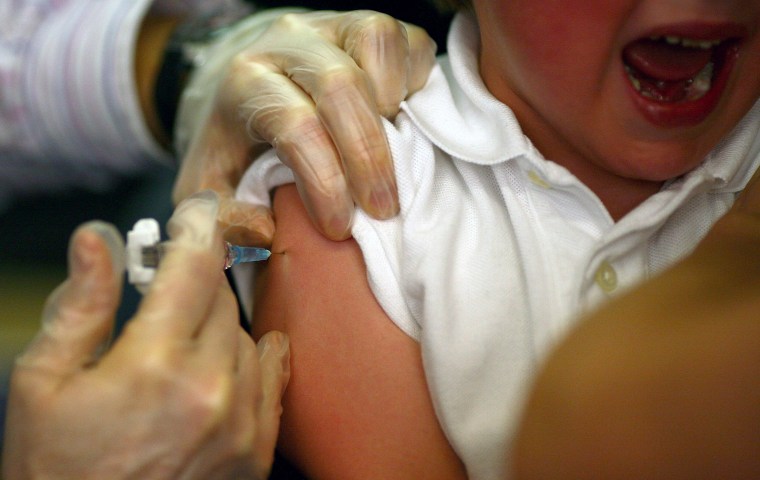Some parents may be afraid that babies and toddlers get too many vaccines all at once, but a new study can help put such worries to rest.
It found that kids who got more vaccines were not any more likely to get unrelated infections than kids who got fewer vaccines, or who had them spaced out more than recommended.
There was not much reason to think that vaccinating children might make them somehow more susceptible to diseases in general, but the researchers said it is important to keep testing, to reassure parents.
The new study, published Tuesday in the Journal of the American Medical Association, looks carefully not just at the number of vaccines, but at the number of antigens — the molecules that actually stimulate immune response.
“Some parents are concerned that multiple vaccines in early childhood could weaken their child’s immune system,” Jason Glanz of the Institute for Health Research at Kaiser Permanente Colorado and colleagues wrote.
It’s true that kids are vaccinated against more diseases than in the past.
“In the past three decades, the routine childhood immunization schedule in the first two years of life expanded from three vaccines against seven diseases to 10 vaccines against 14 diseases,” the team wrote.
Babies are vaccinated against diphtheria and tetanus, whooping cough, measles, mumps and rubella, chickenpox, polio, hepatitis and bugs that cause meningitis, pneumonia and diarrhea.
“Some parents believe this increase in vaccine exposure is harmful to children, with specific concerns that early childhood immunization 'overloads' the immune system and increases the risk for future infection,” Glanz and colleagues added.
“Based in part on this concern, an estimated 10 percent to 15 percent of parents are choosing delayed or alternative immunization schedules for their children.”
Several studies have shown this is not the case, and a 2013 report by the Institute of Medicine, now the National Academy of Medicine, found no evidence that the childhood immunization schedule is not safe.
"The small but vocal minority of antivaccine groups may not be satisfied by the evidence."
Furthermore, vaccines have been fine-tuned. "Although the number of vaccinations recommended is greater than ever before, the vaccines used in the current immunization schedule actually have fewer antigens (inactivated or dead viruses and bacteria, altered bacterial toxins, or altered bacterial toxins that cause disease and infection) because of developments in vaccine technology. From 1980 to 2000, the immunization schedule’s total number of antigens decreased by approximately 96 percent," that 2013 report reads.
A 2005 Danish study found no evidence of vaccine overload, but the hypothesis had not been tested in U.S. kids given the current U.S. vaccine schedule.
Glanz’s team did that, studying 944 kids aged 2 to 4 who caught infections covered by vaccines as well as those not targeted by vaccines, including respiratory and gastrointestinal infections. For instance, many causes of colds and flu-like symptoms are not covered by vaccines, nor is norovirus, the most common cause of “stomach flu”.
Glanz’s team did not simply measure the number of vaccines the children got, but the total number of antigens in those vaccines.
Kids brought to the doctor for a variety of infections were compared to similar healthy children.
The children who got sick got almost precisely the same number of vaccine antigens as those who did not get sick, the study found.
The study proves “robust and reassuring results”, Dr. Sean O’Leary of the University of Colorado and Dr. Yvonne Maldonado of the Stanford University School of Medicine wrote in an editorial.
But it may not stop the vaccine deniers who have become much more active as social media gives them an easy way to voice their opinions without contradiction from experts.
“The present study provides further reassurance to parents that the U.S. childhood vaccination schedule is safe in terms of not being associated with an increased risk of non–vaccine-targeted infections, yet the small but vocal minority of antivaccine groups may not be satisfied by the evidence,” wrote O’Leary and Maldonado, who were not involved in the study.
“For example, insistence by such groups that vaccines cause autism persists, despite overwhelming science to the contrary.”
But they agreed that such studies are useful.
“Simply providing scientific information and assuming parents will make the decision to vaccinate is not enough. Delivering evidence-based information to parents and clinicians in ways that inspire confidence in the robust and safe childhood immunization schedule is critical for maintaining the health of children,” they wrote.
Some parents argue that it is harmless to space out vaccines, but pediatricians say that it can in fact be dangerous or at least troubling to do so.
For instance, older kids are more likely to get fevers after receiving the measles, mumps and rubella (MMR) vaccine. And people who catch measles naturally suffer from suppressed immune systems afterwards.
In addition, the immune systems of teenagers often respond less effectively to vaccines.


